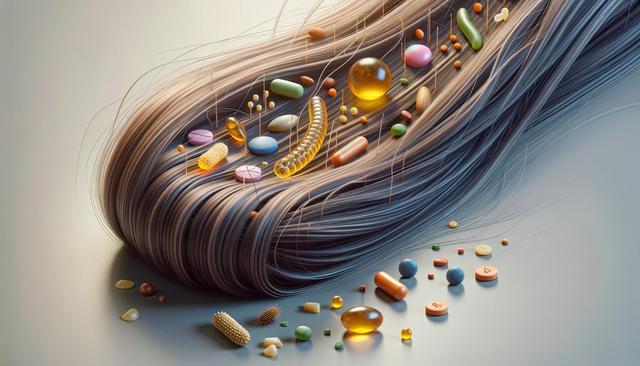
Discover Which Vitamin Deficiencies Might Impact Hair Growth
Understanding the Link Between Nutrition and Hair Health
Hair growth is influenced by a combination of genetics, hormonal balance, and overall health. However, nutrition plays a vital role in maintaining strong, healthy hair. The hair follicle is one of the most metabolically active structures in the body, which means it requires a steady supply of nutrients to function properly. When the body is deficient in certain vitamins or minerals, it may redirect those nutrients to more essential organs, leading to weakened or slowed hair growth. In many cases, hair thinning or excessive shedding can be one of the first visible signs of a nutritional deficiency. Recognizing and addressing these gaps early can help prevent further hair loss and support stronger growth.
Biotin: A Key Player in Hair Structure
Biotin, also known as vitamin B7, supports the production of keratin, a protein that makes up the majority of the hair shaft. A deficiency in biotin can lead to brittle hair, breakage, and even scalp dryness. While true biotin deficiency is rare, certain conditions or medications can reduce its absorption. Symptoms of low biotin levels may include:
- Hair thinning or hair loss
- Dry, flaky scalp
- Skin rashes or irritation around the eyes, nose, and mouth
Fortunately, biotin is found in a variety of foods such as eggs, nuts, seeds, and leafy greens. It’s also commonly included in over-the-counter supplements aimed at supporting hair and nail health. Before starting supplementation, it’s wise to evaluate your current diet and consult a healthcare provider, especially if you’re experiencing unexplained hair changes.
Iron Deficiency and Its Impact on the Hair Growth Cycle
Iron is essential for oxygen transport in the blood. When iron levels are too low, the body may not deliver sufficient oxygen to hair follicles, potentially disrupting the hair growth cycle. This can result in a condition called telogen effluvium, where more hair than usual enters the resting phase and falls out. Individuals most at risk of iron deficiency include:
- Women with heavy menstrual cycles
- Vegetarians or those with limited red meat intake
- People with digestive disorders affecting nutrient absorption
Signs of iron deficiency include fatigue, pale skin, and brittle nails in addition to hair thinning. Iron-rich foods such as lentils, spinach, and fortified cereals can help improve levels naturally. It’s important to confirm iron deficiency with a blood test before starting iron supplements, as excess iron can be harmful.
Vitamin D: Strengthening Follicles from Within
Vitamin D plays a role in the creation of new hair follicles and may help regulate the hair growth cycle. Low levels of vitamin D are commonly associated with hair loss conditions such as alopecia areata. This vitamin also supports immune function, which can indirectly affect scalp health. Factors that contribute to vitamin D deficiency include:
- Limited sun exposure
- Darker skin tones, which reduce vitamin D synthesis
- Dietary restrictions or low intake of fortified foods
To support optimal vitamin D levels, consider spending some time outdoors each day, eating fatty fish or fortified dairy alternatives, and discussing supplementation with a healthcare provider if needed. Addressing vitamin D deficiency might not lead to instant results, but over time, it can contribute to healthier hair growth patterns.
Other Nutrients That Support Hair Growth
Beyond biotin, iron, and vitamin D, several other vitamins and minerals contribute to maintaining healthy hair. These include:
- Vitamin A: Helps produce sebum, the natural oil that moisturizes the scalp
- Vitamin E: Acts as an antioxidant and supports scalp circulation
- Zinc: Plays a role in tissue growth and repair, including hair
- Omega-3 fatty acids: Found in flaxseeds and fish, they help nourish hair from the inside out
While deficiencies in these nutrients are less common, they can still impact hair health, especially when combined with other dietary gaps. A balanced diet that includes a variety of whole foods like fruits, vegetables, whole grains, and lean proteins can significantly support your hair’s appearance and strength. In some cases, a multivitamin may be helpful, but it’s essential to choose one that meets your specific health needs without exceeding the recommended daily intake.
Conclusion: Supporting Hair Health Through Nutrition
If you’re noticing changes in your hair, such as thinning, breakage, or slower growth, it’s worth considering whether your diet is meeting your nutritional needs. While genetics and hormones play a role, vitamin deficiencies—particularly in biotin, iron, and vitamin D—can significantly impact hair health. By identifying and addressing these gaps with the guidance of a healthcare professional, you can take proactive steps toward healthier, fuller-looking hair. A well-rounded diet, sensible supplementation when needed, and routine health checks can make a meaningful difference in how your hair looks and feels over time.


